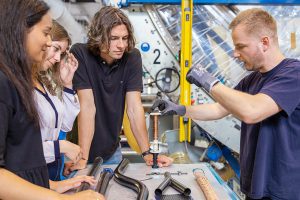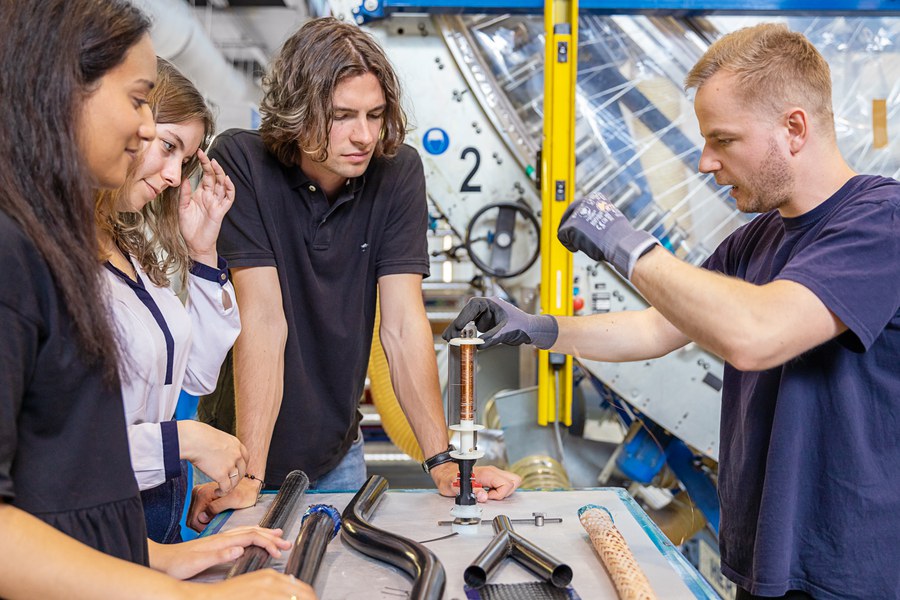Understanding how to become a mechanical engineer involves earning a bachelor’s degree in mechanical engineering or a related field, alongside gaining practical experience through internships or apprenticeships. Mechanical engineering is a diverse and innovative field that plays a critical role in developing new technologies, machinery, and products that we use daily. If you have a passion for problem-solving, design, and building things, then a career as a mechanical engineer could be an excellent choice for you. This guide will cover what it takes to become a mechanical engineer, the skills you need to succeed, and how to advance in this dynamic field.
What Are the Main Types of Mechanical Engineers?
Mechanical engineering is one of the most diversified fields in the profession, offering a wide range of career options. Heavy engineering has numerous specialisations. Here are several types of mechanical engineers:
- Design Engineers: Focus on producing new products and systems or improving existing ones based on input and requirements from customers, business teams, or outside markets. They use specialised computer-aided design (CAD) software to develop products or systems from scratch or enhance existing ones. They create product models, and various renderings, conduct production simulation tests, create specifications for purchasing materials and components, and ultimately develop and approve detailed blueprints that specify dimensions and tolerances, serving as a guide for manufacturing.
- Manufacturing Engineers: These engineers optimise production processes to enhance efficiency and reduce costs. They develop factory layouts, implement automation, and establish quality control standards. Their work ensures products meet specifications and regulatory requirements. They collaborate with design engineers to facilitate smooth transitions from design to manufacturing. Continuous improvement initiatives are also a key focus.
- Automotive Engineers: Automotive engineers design and develop vehicles, focusing on components like engines and safety systems. They conduct testing to ensure performance and compliance with safety standards. Their work includes enhancing fuel efficiency and integrating new technologies, especially in electric vehicles. They utilise advanced simulation tools and coordinate with manufacturing teams. Their role is crucial in adapting to industry shifts towards sustainability.
- Aerospace Engineers: Aerospace engineers design and test aircraft and spacecraft, addressing aerodynamics, propulsion, and structural integrity. They use computer modelling and simulation to predict performance under various conditions. Their work ensures safety and reliability in extreme environments. Collaboration with regulatory bodies and other engineers is essential for compliance. They play a vital role in advancing aerospace technology and innovation.
- HVAC and Building Services Engineers: They design, install, maintain, and advise on the integration and use of mechanical services in buildings, such as heating, ventilation, and air conditioning (HVAC) systems, lighting, and plumbing. Their aim is to create comfortable, efficient, cost-effective, healthy, and environmentally friendly buildings while complying with building regulations.
- Energy and Power Plant Engineers: These experts work on energy production and distribution systems, including turbines, generators, and power plants, whether for traditional fossil fuel sources or renewable options like solar and wind.
- Biomedical Engineers: At the intersection of engineering and medicine, biomedical engineers develop medical devices and prostheses, diagnostic and therapeutic systems, and medical information to enhance healthcare. They play a crucial role in the innovation of new medical technologies for diagnosis, treatment, and rehabilitation.
- Robotic and Automation Engineers: Responsible for designing robots and automated devices to perform industrial, healthcare, and other operations, these engineers determine the mechanical, electrical, and software components needed to enable automated devices to function effectively, including tracking, responsiveness, decision-making, and mobility.
What Does a Mechanical Engineer Do?
Mechanical engineers are responsible for designing, developing, testing, and manufacturing mechanical devices and systems. Their specific duties can vary widely based on their specialisation, but typical responsibilities of Mechanical engineers include here:

- Design and Development: Mechanical engineers use computer-aided design (CAD) software to transform concepts into detailed models and technical drawings. They take a multidisciplinary approach, considering materials, manufacturing processes, costs, and functionality. This phase involves collaboration with various specialists to ensure feasibility and market relevance. Decisions made here impact the overall success of the final product. Their aim is to create innovative designs that meet client needs.
- Prototyping and Testing: Engineers create prototypes to validate their designs, ensuring compliance with safety, quality, and performance standards. This includes conducting simulations and physical stress tests to identify weaknesses. Analyzing test results allows for informed modifications and refinements. The goal is to enhance reliability and meet regulatory requirements before production. This iterative process is crucial for achieving a successful final product.
- Problem-Solving and Troubleshooting: A key skill for engineers is diagnosing and resolving issues within mechanical systems. They analyse machinery failures, identify root causes, and propose effective solutions to enhance efficiency. This may involve pinpointing faults, such as damaged components or design flaws. Their problem-solving approach blends analytical skills with practical knowledge. Continuous improvement is essential to prevent future issues and optimise performance.
- Process and Product Oversight: Mechanical engineers oversee manufacturing processes to ensure efficiency and adherence to specifications. They monitor production lines, identify bottlenecks, and implement improvements in collaboration with manufacturing teams. Regular audits and inspections are conducted to maintain quality and compliance with industry standards. Their role balances productivity with product integrity. This oversight is vital for achieving operational success.
- Research and Development (R&D): Engineers engage in R&D to innovate and enhance technologies, exploring new materials and systems. They conduct feasibility studies and prototype new solutions to assess their potential impact. A focus on sustainability drives their efforts to reduce energy consumption and waste. Collaborating with other disciplines is common during this phase. Their work lays the foundation for future advancements in engineering.
- Teamwork and Communication: Mechanical engineers collaborate within cross-functional teams, requiring effective communication of complex technical information. They must convey ideas clearly to colleagues and stakeholders, facilitating collaboration. This includes producing detailed documentation and presentations. Strong interpersonal skills are essential for fostering a productive team environment. Their ability to communicate effectively contributes to project success.
- Documenting and Reporting: Accurate documentation is crucial for tracking a project’s progress, including design iterations and testing outcomes. Engineers write detailed reports and create technical drawings to serve as blueprints for manufacturing. Maintaining comprehensive records ensures transparency and compliance with standards. This documentation supports knowledge transfer and future reference. It is vital for the successful execution of engineering projects.
Mechanical engineers develop and improve products that impact nearly every commercial activity, including automobiles, airlines, energy production, and medical devices.
Average Mechanical Engineer Salary in the UK
The salary of a mechanical engineer in the UK varies depending on experience, location, and the specific sector they work in.

Since the role of a mechanical engineer is quite broad, depending on the company and sector, salaries tend to vary within the same country. For example, in the UK, mechanical engineers with up to a year of experience earn an average salary ranging from £24,000 to £28,000 per year.
Over time, salaries typically increase, generally falling between £30,000 and £45,000, or higher for more senior positions, which can range from £50,000 to £70,000 or more. In specialised fields—such as aerospace or energy—or in managerial roles, salaries are often higher, particularly in London.
Additionally, aside from the basic salary, mechanical engineers working in research, design, or consulting may have opportunities to earn bonuses or other benefits, depending on their employer.
Essential Skills of a Mechanical Engineer
To become a successful mechanical engineer, one must possess various technical and soft skills required to become a mechanical engineer:
- Technical Competence and Mechanical Craft: A strong understanding of mechanical systems, materials, engines, and thermodynamics is essential for engineers. Knowledge of how machines operate is crucial for effective design and innovation. Mechanical aptitude is a fundamental focus in engineering education. This competence enables engineers to create efficient and functional systems. Mastery in these areas lays the foundation for successful engineering practice.
- CAD and Design Skills: Proficiency in computer-aided design (CAD) software is vital for creating accurate models and designs. Engineers use CAD to modify and analyse designs quickly, facilitating iterative improvements. Strong skills in CAD ensure that models are both functional and manufacturable. Understanding design standards is essential for producing quality outcomes. These skills are crucial for translating concepts into practical applications.
- Mathematics and Analytical Skills: Mechanical engineers utilise mathematics and physics to analyse data and solve complex problems daily. Skills in calculus, algebra, and statistics are vital for optimising designs and ensuring compliance with engineering principles. Strong analytical and critical-thinking abilities enable effective evaluation of design effectiveness. This approach helps identify potential issues early. Rigorous analysis is key to ensuring safe and efficient system operation.
- Problem-Solving and Innovation: Engineers must think creatively to develop practical solutions to technical challenges. This involves diagnosing existing problems and anticipating future challenges. Innovation may include enhancing current products or creating entirely new technologies. Engineers draw on their technical knowledge and creativity to explore alternative solutions. This skill set is crucial for pushing the boundaries of engineering.
- Communication and Teamwork: Effective communication is essential for collaboration with multidisciplinary teams. Engineers must clearly articulate technical concepts to colleagues and clients. Training in giving and receiving constructive feedback enhances team dynamics. Strong speaking and listening skills facilitate effective collaboration. These abilities ensure that technical information is understood by all stakeholders.
- Project Management and Organisation: Mechanical engineers often manage multiple projects simultaneously, requiring strong organisational skills. They must effectively allocate time and resources to meet deadlines. Creating project timelines and monitoring progress is essential for success. Maintaining thorough documentation helps track changes and ensures compliance. Good organisational skills contribute to high-quality project outcomes.
- Attention to Detail and Precision: Attention to detail is critical in mechanical engineering, where precision is paramount. Engineers must verify measurements and review specifications carefully. This meticulousness ensures that projects meet required standards and specifications. Careful execution helps prevent costly errors and safety hazards. Precision in design and execution is essential for project success.
Mechanical Engineer Tips

Here are some tips for aspiring mechanical engineers:
- Gain Hands-On Experience Early: Experience is crucial. Intern in an engineering role while you’re in college, or seek an apprenticeship or part-time work. Real-world experience will enhance your engineering skills and marketability.
- Master CAD Software & Technical Tools: Every mechanical engineer should be proficient in CAD software, such as SolidWorks, AutoCAD, and MATLAB. Learning these tools as early as possible will benefit you both in school and in your future career.
- Focus on Problem-Solving and Analytical Thinking: Developing your problem-solving skills will enable you to make informed decisions on critical issues, such as sustainability and environmental stewardship. Engaging with real engineering challenges by joining engineering clubs and participating in design competitions will set you apart. Creative thinking about solutions to global challenges is essential.
- Network with Other Engineers and Professional Institutes: Join professional organisations like the Institution of Mechanical Engineers (IMechE) to expand your network. This will provide opportunities to meet experienced engineers, access institute events, and potentially secure sponsorship when applying for jobs.
- Keep On Top of Industry Trends and Technology: Mechanical engineering is a broad field that continually evolves with new technologies and methodologies. Staying updated on developments in areas like materials science, renewable energy, and automation can significantly enhance your practice and keep your work exciting.
- Specialise in a Niche Area: While mechanical engineering encompasses a wide range of topics, there are numerous specialisation opportunities. If you’re interested in robotics, automotive design, or renewable energy, focusing your efforts in these areas can give you an advantage over your peers and help you establish yourself as a specialist.
Mechanical Engineer Requirements
Becoming a mechanical engineer in the UK usually requires an appropriate combination of formal study, training, and experience:
- Educational Background: Applicants for mechanical engineering jobs generally need a bachelor’s degree in mechanical engineering or a related field such as aerospace, automotive, or manufacturing engineering. Degrees accredited by an external authority are advantageous, as many employers prefer degrees from recognised universities or engineering programmes.
- Other Courses or Qualifications: Many engineers pursue additional courses or qualifications to boost their career prospects. Specialised courses in engineering management or advanced mechanical systems can enhance professional standing and expertise. These qualifications demonstrate a commitment to lifelong learning and adaptability in a competitive job market. Engaging in niche areas, such as renewable energy, can provide a competitive edge. Continuous education is crucial for career advancement and relevance in the field.
- Professional Memberships: Seeking professional accreditation, such as membership in the Institution of Mechanical Engineers (IMechE), is vital for career growth. Membership offers networking opportunities and access to industry resources, events, and workshops. Achieving Chartered Engineer (CEng) status signifies high proficiency and competence, making engineers more attractive to employers. Chartered status also opens doors to advanced career opportunities and professional recognition. Staying connected with professional bodies helps engineers keep abreast of industry trends.
- Apprenticeship and Training Programmes: Apprenticeships offer a practical pathway into mechanical engineering, blending classroom learning with hands-on experience. These programmes allow apprentices to earn while they learn and gain valuable skills in real work environments. Apprenticeships often lead to recognised qualifications, such as NVQs, enhancing employability. This dual approach provides insights into workplace dynamics and professional expectations. Many apprentices secure full-time positions upon completion, facilitating a smooth transition to employment.
- Skills and Experience: Developing practical skills through internships or part-time positions is essential for aspiring engineers. Real-world experience allows students to apply theoretical knowledge and build essential workplace skills, like teamwork and communication. Participation in engineering projects, whether through university clubs or personal initiatives, enhances hands-on experience. This involvement helps create a strong portfolio showcasing skills and capabilities to potential employers. Practical experience is key to standing out in a competitive job market.
How to Become a Mechanical Engineer
Seek a Relevant Degree: First, complete a bachelor’s degree in mechanical engineering or a related field at an accredited university. Your chosen programme should provide core competencies in mathematics, physics, mechanics, and materials science.

- Earn a Relevant Degree: Start by obtaining a Bachelor’s degree in mechanical engineering or a related field from an accredited university. Make sure the program provides a strong foundation in mathematics, physics, mechanics, and materials science.
- Get Professional Training and Development: Once you have graduated, look for a graduate engineering job or apprenticeship where you can continue to develop your technical and professional skills while working.
- Obtain Accreditation or Professional Registration: Becoming a member of the Institution of Mechanical Engineers (IMechE) and striving to achieve Chartered Engineer (CEng) status will enhance your career prospects and demonstrate your commitment to professional excellence and continuous learning.
- Get a Varied Portfolio of Engineering Projects: Develop a diverse range of skills, problem-solving expertise, and creative ideas by working on various projects. A well-rounded portfolio will catch the attention of potential employers.
- Specialise or Get a Master’s: Depending on your career goals, consider specialising in a specific area of mechanical engineering or pursuing a master’s degree to enhance your career opportunities or to prepare for a research-focused role.
Get Qualified as a Mechanical Engineer
Mechanical Engineering Online Course, Mechanical Engineering Essentials, Mechanical Engineering Training, Fundamentals of Mechanical Engineering
Frequently Asked Questions
Why Should You Become a Mechanical Engineer?
Mechanical engineering can be a rewarding career if you enjoy design and building, problem-solving, and working on challenging projects. You’ll engage in a wide variety of distinct projects that can have real-world and tangible benefits.
Is Mechanical Engineering a Good Career Choice for You?
Consider mechanical engineering if you possess creative thinking, outstanding analytical skills, and enjoy taking complex systems apart and putting them back together. The field offers variety, with plenty of companies across various industries. Additionally, it promotes lifelong learning as you keep up with the latest technologies.
What Are the Salary Prospects for Mechanical Engineers?
Young mechanical engineers in the UK can expect salaries between £24,000 and £28,000 at the graduate level. With several years of experience, this can increase to £32,000 to £45,000, and for senior roles and specialists, salaries can range from £50,000 to £70,000 or more.
Which Qualifications Can Help with a Career in Mechanical Engineering?
A BEng degree in mechanical engineering or a related discipline is essential, although an MEng degree is even more advantageous. It’s also beneficial to obtain professional qualifications and Chartered Engineer (CEng) status from the relevant authority, in this case, the Institution of Mechanical Engineers (IMechE).
Do You Need Prior Experience to Start a Career in Mechanical Engineering?
Experience is valuable, but you can start gaining it while you’re studying. Internships, apprenticeships, and your university’s engineering projects allow you to hone practical skills and apply the theory you’re learning.
What Is the Career Outlook for Mechanical Engineers?
The demand for mechanical engineers is relatively stable. There are usually job openings in sectors such as manufacturing, energy, automotive, and aerospace. Demand is not prone to significant fluctuations; opportunities in renewable energy, robotics, and new manufacturing processes help to sustain this stability.
What Are the Career Progression Options for Mechanical Engineers?
A mechanical engineer’s career path typically progresses from graduate engineer to engineer, then to senior engineer, project manager, and engineering director. Additionally, specialisation or further qualifications can lead to roles in areas such as research, consultancy, or teaching.
What Are the Exit Options and Opportunities Beyond Mechanical Engineering?
Many technical and interpersonal skills acquired as a mechanical engineer—such as problem-solving, technical design, and project management—are transferable to other engineering disciplines, product development for consumer goods, various consulting roles, and even management positions. Engineers may also consider entrepreneurship or opportunities within technology start-ups.


